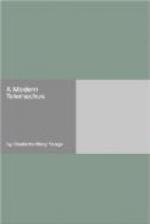The city, in spite of its external beauty, proved to be ruinous within, and in the midst of the Moorish houses and courts still were visible remnants of the old Roman town that had in past ages flourished there. Like Algiers, it had narrow climbing streets, excluding sunshine, and through these the guide Ibrahim had secured led the way; while in single file came the interpreter, Arthur, two black slaves bearing presents for the Marabout, and four men besides as escort. Once or twice there was a vista down a broader space, with an awning over it, where selling and buying were going on, always of some single species of merchandise.
Thus they arrived at one of those Moorish houses, to whose beauty Arthur was becoming accustomed. It had, however, a less luxurious and grave aspect than the palaces of Algiers, and the green colour sacred to the Prophet prevailed in the inlaid work, which Ibrahim Aga told him consisted chiefly of maxims from the Koran.
No soldiers were on guard, but there were a good many young men wholly clad in white—neophytes endeavouring to study the fifty sciences, mostly sitting on the ground, writing copies, either of the sacred books, or of the treatises on science and medicine which had descended from time almost immemorial; all rehearsed aloud what they learnt or wrote, so as to produce a strange hum. A grave official, similarly clad, but with a green sash, came to meet them, and told them that the chief Marabout was sick; but on hearing from the interpreter that they were bearers of a letter from the Dey, he went back with the intelligence, and presently returned salaaming very low, to introduce them to another of the large halls with lacework ceilings, where it was explained that the Grand Marabout was, who was suffering from ague. The fit was passing off, and he would be able to attend of the coffee and the pipes which were presented to his honoured guests so soon as they had partaken them.
After a delay, very trying to Arthur’s anxiety, though beguiled by such coffee and tobacco as he was never likely to encounter again, Hadji Eseb Ben Hassan, a venerable-looking man, appeared, with a fine white beard and keen eyes, slenderly formed, and with an air of very considerable ability—much more so than the Dey, in all his glittering splendour of gold, jewels, and embroidery, whereas this old man wore the pure white woollen garments of the Moor, with the green sash, and an emerald to fasten the folds of his white turban.
Ibrahim Aga prostrated himself as if before the Dey, and laid before the Marabout, as a first gift, a gold watch; then, after a blessing had been given in return, he produced with great ceremony the Dey’s letter, to which every one in the apartment did obeisance by touching the floor with their foreheads, and the Grand Marabout further rubbed it on his brow before proceeding to read it, which he chose to do for himself, chanting it out in a low, humming voice. It was only a




